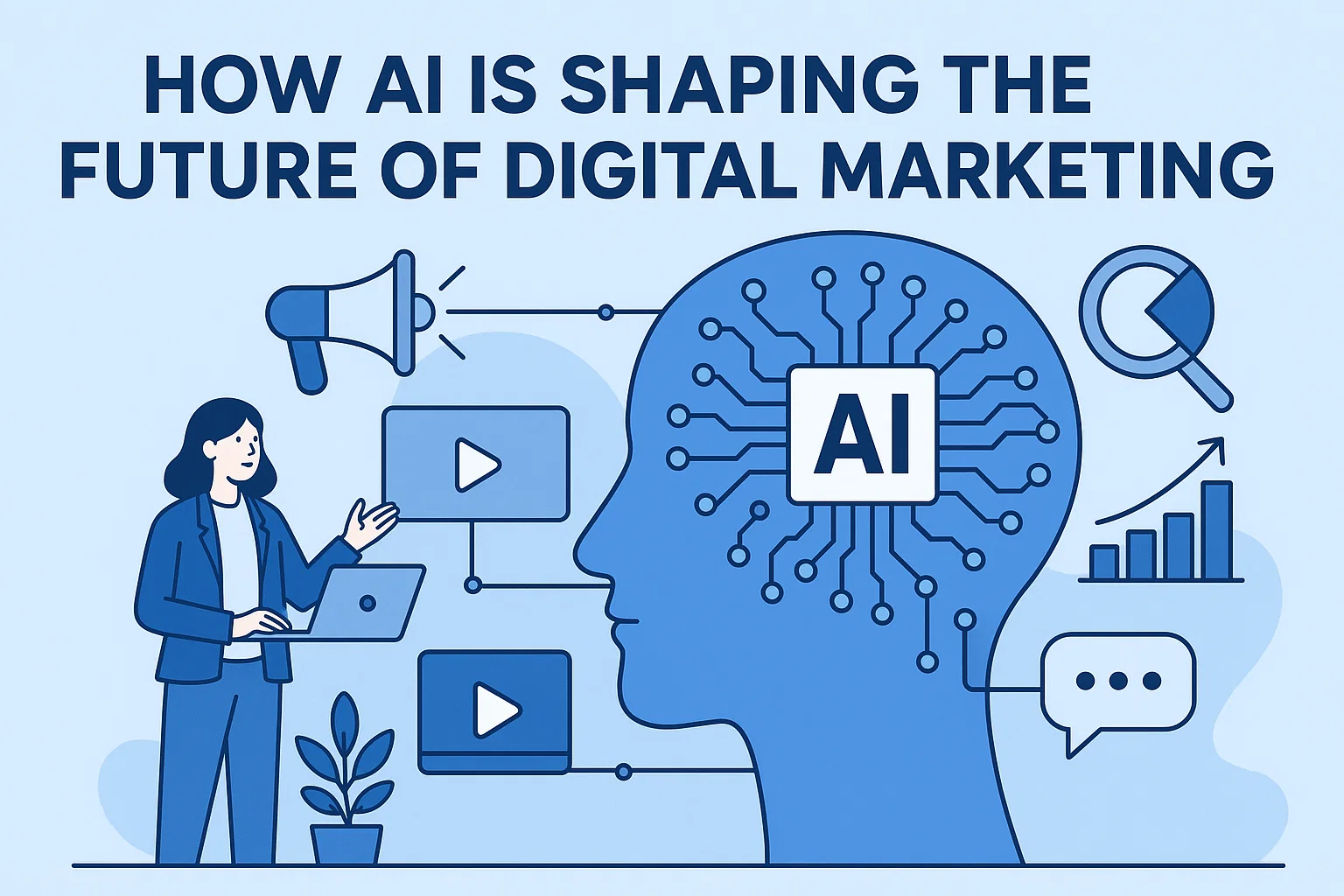Artificial Intelligence (AI) is no longer just a buzzword—it’s a transformative force that is revolutionizing industries across the globe, particularly in digital marketing. As technology continues to evolve, AI is becoming an integral tool for businesses aiming to stay ahead of the competition, improve customer experiences, and drive business growth. In this blog, we’ll explore how AI is shaping the future of digital marketing and why businesses need to embrace it to stay competitive in 2025 and beyond.
What is AI in Digital Marketing?
AI in digital marketing refers to the use of intelligent algorithms and machine learning models to analyze data, automate tasks, optimize campaigns, and provide personalized experiences to consumers. From predictive analytics to AI-powered chatbots, AI is enhancing every aspect of digital marketing, allowing businesses to create smarter, more efficient campaigns.
In 2025, AI is expected to be at the forefront of digital marketing strategies, making it easier for businesses to meet consumer demands and improve ROI. Here’s how AI is making a significant impact on the industry.
1. Personalized Customer Experiences at Scale
One of the most exciting ways AI is transforming digital marketing is through personalization. Traditionally, businesses would segment their audience into broad categories and create one-size-fits-all campaigns. However, AI allows marketers to personalize content and experiences on an individual level, at scale.
- Product Recommendations: AI algorithms analyze past customer behavior, browsing history, and demographic data to suggest personalized products or services. Retail giants like Amazon have already mastered this approach, offering product recommendations based on individual preferences.
- Dynamic Content: AI-powered systems adjust the content that users see on websites or in ads, tailoring it to their specific interests, making the content more relevant and engaging.
Impact: Personalized marketing not only enhances the customer experience but also drives higher engagement and conversion rates. By delivering the right message at the right time, businesses can boost customer satisfaction and brand loyalty.
2. AI-Powered Chatbots for Real-Time Customer Engagement
AI-driven chatbots are becoming a staple in customer engagement strategies. These intelligent systems can simulate conversations with users in real-time, providing instant support, answering frequently asked questions, and guiding users through the sales funnel.
- 24/7 Availability: AI chatbots can engage with customers at any time of day, ensuring that no query goes unanswered. This constant availability improves customer service and ensures that businesses are always ready to assist potential customers.
- Lead Qualification: AI chatbots can qualify leads by asking relevant questions and directing them to the appropriate products or services. They can even schedule appointments or process simple transactions.
Impact: Chatbots enhance the customer experience by providing quick, accurate, and personalized interactions. This not only reduces response times but also improves conversion rates by guiding potential customers to the information they need.
3. Predictive Analytics for Smarter Decision-Making
AI’s ability to process vast amounts of data quickly and accurately has made predictive analytics an essential tool for digital marketers. By analyzing historical data, AI can predict future consumer behavior, enabling businesses to make more informed decisions about marketing strategies.
- Customer Lifetime Value (CLV): AI helps businesses predict which customers are likely to bring the most value over time, allowing marketers to prioritize high-value customers and tailor campaigns accordingly.
- Churn Prediction: AI can also identify patterns that indicate when a customer is likely to leave (churn). By recognizing these early signs, businesses can implement targeted retention strategies to reduce churn and keep customers engaged.
Impact: Predictive analytics empowers businesses to optimize their marketing campaigns by focusing on the most profitable customers, improving ROI, and enhancing customer retention strategies.
4. AI-Driven Content Creation
Content creation is one of the most time-consuming tasks in digital marketing. With the rise of AI, marketers now have access to tools that can help automate and streamline content creation. AI is capable of generating written content, images, videos, and even social media posts.
- Natural Language Generation (NLG): AI tools like GPT-3 can generate high-quality written content, such as blog posts, product descriptions, or social media captions, based on specific parameters set by marketers.
- Visual Content Creation: AI tools can also help design graphics, videos, and advertisements that align with brand guidelines, improving efficiency and saving time for marketers.
Impact: AI-driven content creation not only speeds up the content production process but also allows for more dynamic and tailored content that resonates with the audience, increasing engagement.
5. Automated Campaign Optimization
AI has the ability to automate and optimize digital marketing campaigns in real-time. Traditional marketing strategies involved constant manual adjustments and A/B testing to find the most effective approaches. With AI, marketers can automate these tasks and ensure that campaigns are continually optimized.
- Dynamic Ad Optimization: AI algorithms can monitor ad performance and automatically adjust bids, targeting parameters, and creatives to improve results. This ensures that ads are continuously optimized for the best performance.
- Budget Allocation: AI can analyze campaign performance and automatically adjust marketing budgets, ensuring that funds are allocated to the most effective channels.
Impact: Automated optimization reduces the time and effort marketers need to spend adjusting campaigns manually, leading to higher efficiency, lower costs, and improved campaign performance.
6. Voice Search and AI-Driven SEO
As voice search continues to grow, AI is playing a crucial role in shaping SEO strategies. Voice search queries are often longer and more conversational than traditional text-based queries, making it essential for businesses to adapt their SEO strategies.
- Voice Search Optimization: AI helps marketers understand the nuances of voice search and optimize content for conversational keywords and natural language queries.
- AI-Powered SEO Tools: Tools like Google RankBrain and BERT use AI to better understand search intent and context, enabling marketers to optimize their content for more accurate search results.
Impact: AI-powered SEO tools make it easier for businesses to optimize their websites for voice search, improving their chances of ranking higher and getting discovered by voice search users.
7. Social Media Listening and Sentiment Analysis
AI is revolutionizing social media marketing by enabling businesses to understand consumer sentiment and track brand mentions across social media platforms. Through social listening, AI can help businesses monitor conversations about their brand, competitors, and industry.
- Sentiment Analysis: AI algorithms can analyze social media conversations to gauge public sentiment toward a brand or product. This allows businesses to adjust their messaging or marketing strategies based on customer feedback.
- Trend Identification: AI can identify emerging trends, popular topics, and key influencers, helping businesses stay ahead of the competition and tailor their social media strategies accordingly.
Impact: Social media listening powered by AI helps businesses respond to customer concerns, capitalize on trends, and maintain a positive brand image, enhancing customer engagement and loyalty.
Conclusion
AI is no longer a futuristic technology—it’s already here, and it’s revolutionizing the way businesses engage with their customers. From personalized experiences and automated campaigns to predictive analytics and voice search optimization, AI offers powerful tools to improve digital marketing strategies and drive business growth.
At Speed Dot 360, we’re at the forefront of integrating AI into digital marketing strategies to help businesses maximize their potential. By harnessing the power of AI, businesses can create more efficient, personalized, and impactful marketing campaigns that deliver real results.
If you’re ready to embrace the future of digital marketing with AI, get in touch with us today to learn how we can help optimize your marketing efforts and grow your business.
Frequently Asked Questions
Q1: How can AI improve my digital marketing strategy?
AI can improve your digital marketing strategy by automating tasks, personalizing customer experiences, optimizing campaigns in real-time, and providing valuable insights into customer behavior.
Q2: What is the role of AI in SEO?
AI plays a key role in SEO by improving search engine algorithms, optimizing content for voice search, and using predictive analytics to adjust SEO strategies based on performance.
Q3: Can AI create content for my marketing campaigns?
Yes, AI can generate content, from blog posts to product descriptions and social media captions, by analyzing data and producing relevant content based on defined parameters.
Q4: Is AI suitable for small businesses?
Absolutely! AI-driven marketing tools can be a game-changer for small businesses by automating tasks, optimizing campaigns, and providing personalized customer experiences, all of which help boost efficiency and growth.
Q5: How does AI impact customer engagement?
AI enhances customer engagement by personalizing experiences, automating responses, and providing real-time interactions through chatbots and predictive analytics. This leads to improved customer satisfaction and loyalty.





